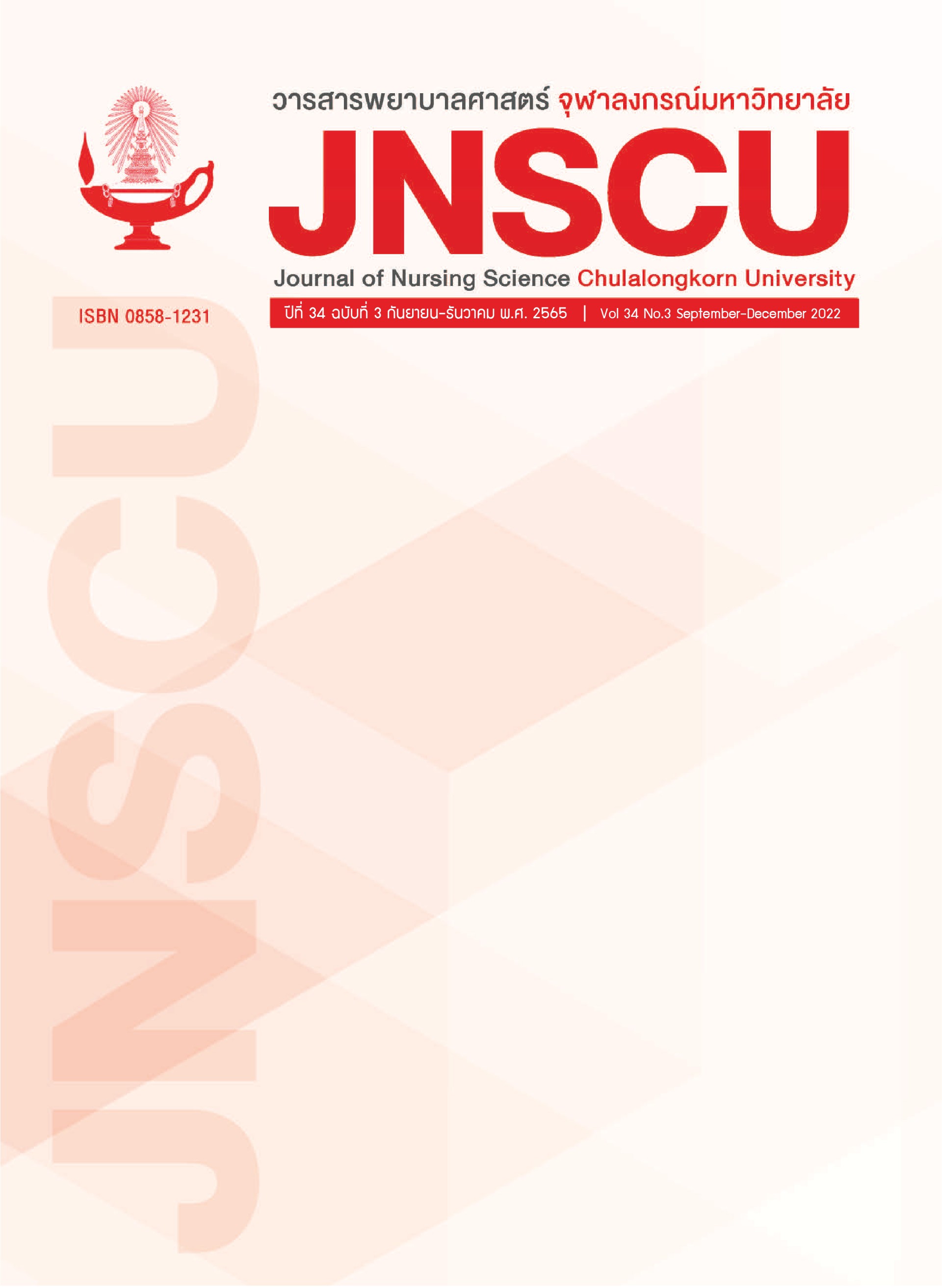แบบแผนความเชื่อด้านสุขภาพกับพฤติกรรมส่งเสริมสุขภาพของสตรีวัยรุ่นตั้งครรภ์แรก
คำสำคัญ:
แบบแผนความเชื่อด้านสุขภาพ, พฤติกรรมส่งเสริมสุขภาพ, สตรีวัยรุ่นตั้งครรภ์แรกบทคัดย่อ
วัตถุประสงค์: เพื่อศึกษาแบบแผนความเชื่อด้านสุขภาพและความสัมพันธ์ระหว่างแบบแผนความเชื่อ ด้านสุขภาพกับพฤติกรรมส่งเสริมสุขภาพของสตรีวัยรุ่นตั้งครรภ์แรก
รูปแบบการวิจัย: การวิจัยผสานวิธี
วิธีดำเนินการ: กลุ่มตัวอย่างเชิงปริมาณ คือ สตรีวัยรุ่นตั้งครรภ์แรกจำนวน 124 คน โดยการเลือกแบบเจาะจง ข้อมูลเชิงคุณภาพ คือ สตรีวัยรุ่นตั้งครรภ์แรก 12 คนที่ผ่านการตอบแบบสอบถาม โดยการสัมภาษณ์เชิงลึก สุ่มแบบลูกโซ่ และการสนทนากลุ่ม 10 คน เลือกแบบเจาะจง เครื่องมือที่ใช้ในการวิจัย คือ แบบสอบถามการรับรู้ความเชื่อด้านสุขภาพ และแบบสอบถามพฤติกรรมส่งเสริมสุขภาพ ค่าความเชื่อมั่นระหว่าง 0.79-0.90 ตามลำดับ การวิเคราะห์ข้อมูล ได้แก่ ร้อยละ ค่าเฉลี่ย ค่าเบี่ยงเบนมาตรฐาน สหสัมพันธ์แบบเพียร์สัน และการวิเคราะห์เชิงเนื้อหา
ผลการวิจัย: 1) การวิจัยเชิงปริมาณ พบว่า การรับรู้ความเสี่ยงและความรุนแรง การรับรู้ประโยชน์ และการรับรู้ความสามารถ มีความสัมพันธ์เชิงบวกกับพฤติกรรมส่งเสริมสุขภาพ อย่างมีนัยสำคัญทางสถิติ ที่ระดับ 0.01, 2) การวิจัยเชิงคุณภาพ พบว่า สตรีวัยรุ่นตั้งครรภ์มีการรับรู้ความเสี่ยงและความรุนแรง จากพฤติกรรมสุขภาพไม่เหมาะสม การรับรู้ประโยชน์ จากพฤติกรรมการบริโภคอาหารที่ถูกต้อง การดูแลตนเอง การติดตามนัดหมาย การรับรู้ความสามารถ จากการเห็นคุณค่าตนเอง การดูแลตนเอง และการแก้ไขปัญหาสุขภาพ
สรุป: ความเชื่อด้านสุขภาพมีความสัมพันธ์กับพฤติกรรมส่งเสริมสุขภาพ ดังนั้น บุคลากรทางการแพทย์ควรพัฒนาโปรแกรมการดูแลตนเองของสตรีวัยรุ่นตั้งครรภ์แรก
ดาวน์โหลด
เผยแพร่แล้ว
ฉบับ
ประเภทบทความ
สัญญาอนุญาต

อนุญาตภายใต้เงื่อนไข Creative Commons Attribution-NonCommercial-NoDerivatives 4.0 International License.
##default.contextSettings.thaijo.licenseTerms##


